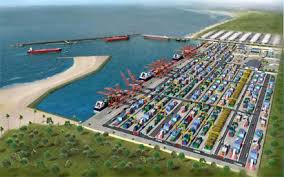Lekki Free Trade Zone to create 900,000 jobs
…as Dangote Oil Refinery to create additional 235,000
The Lekki Free Trade Zone is to create 300,000 direct and 600, 000 indirect jobs when it is finally completed. In addition, the Dangote Oil Refinery is expected to create employment for over 235,000 people.
In a statement released by the Lagos State Government, the Free Trade Zone will also provide accommodation to over 120,000 residents, as well as businesses, real estate development and other related infrastructure.

Located at the Eastern part of Lekki, the Free Trade Zone is divided into three functional districts; the residential district in the North, industrial district in the middle, and the commercial trading/warehousing in the South.
Other features of the FTZ include; roads which will serve as a central business district of the free zone. The area along E2 Road will be developed for financial and commercial businesses, estate properties, supporting facilities, high-end production service, industries and others which will link to the sub-centre of the zone. E4 Roads will be utilized mainly for the development of logistics and industrial manufacturing/processing.
A number of connection axes are also planned in-between the principal axis and the sub-axis, with multi-functional service nodes to serve the whole of Lekki FTZ.
Also, in the start-up area of the Lekki Free Trade Zone, there will be a Commercial Logistics Park which will cover a total area of 1.5 square kilometres.
The Park was planned to be multi-functional with the integration of commerce, trading, warehousing, and exhibition. According to the Site Plan of the park, large
construction works will be built in the park, including the international commodities and trade centre, the international exhibition and conversation centre, industrial factory workshops, logistics warehouses, office buildings, hotels and residential apartment buildings, amongst others.
The Lekki Free Trade Zone will operate zero corporate income tax on free zone income, zero withholding tax on dividends, zero VAT on purchases made within the free zone. The FTZ will also operate without customs duties on imports, exemption from FX controls, Repatriation of foreign capital investment and gains in the zone up to 100% foreign ownership of business.
The Lekki Free Trade Zone is regulated by the Nigerian Export Processing Authority, and is subject to the laws of the Federal Republic of Nigeria. The zone will be managed in accordance with international best practices.
The zone when operational, will become the premiere distribution hub in West Africa, with revenue generation running into $ billions.
Information made available revealed that the zone which was created in 2006 by the Lagos State Government, has had the first phase completed and the work is expected to be delivered for before the end of fourth quarter 2022.
Information reveals that Nigeria adopted Free Trade Zone Model in 1992 following the enactment of Nigerian Export Processing Zones Act 63 in 1989, after China achieved rapid, inclusive and sustainable industrialisation, job creation and diversified export earnings on the back of Special Economic Zones.
Experts in the field say the creation of FTZ is one of the fastest ways to boost industrialisation, but regret that many of the zones across the country are in a pathetic state, while the country’s level of industrialisation, oil export and annual Foreign Direct Investment at $ 2billion is still low.































